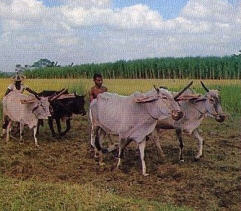A look at the worldwide activities of the
International Society for Krishna Consciousness (ISKCON)
66 Million Books Now In Print
Just-released Bhaktivedanta Book Trust figures (for the period October 1966 to March 1978) show that Srila Prabhupada's translations of India's Vedic literatures now appear in some twenty-seven languages and have gone well over the sixty-six-million mark:
LanguageBooks in Print

1. English49,478,695
2. Spanish4,205,000
3. German2,856,000
4. French 2,425,000
5. Japanese2,125,000
6. Portuguese1,156,000
7. Dutch878,000
8. Hindi696,000
9. Italian598,000
10. Bengali570,000
11. Swedish300,000
12. Gujarati208,000
13. Telugu137,000
14. Swahili114,000
15. Chinese75,000
16. Hebrew50,000
17. Marathi35,000
18. Yugoslavian30,000
19. Hungarian20,000
20. Korean20,000
21.Nepali20,000
22. Oriya20,000
23. Polish20,000
24. Czechoslovakian10,000
25. Tamil10,000
26. Arabic5,000
27. Russian5,000
Total66,066,695
ISKCON Food Relief Gets Government Support

Recently Jayapataka Svami, the All-India Coordinator of ISKCON Food Relief, announced that large-scale food distribution is going on steadily at five ISKCON centers—Mayapur and Haridaspur (province of West Bengal), Bhuvanesvara and Bhadrak (province of Orissa), and Hyderabad (province of Andhra Pradesh).
After meeting in New Delhi with two of the Indian government's secretaries of agriculture, Sri A. Das and Sri S. P. Mukherjee, Jayapataka Svami reported that both men were favorably impressed with ISKCON Food Reliefs work in India. Mr. Das and Mr. Mukherjee promised that the Indian government would help ISKCON import grains, butter, oil, and powdered milk from nations with food surpluses. Jayapataka Svami said the secretaries would like to see ISKCON expand its food relief and welfare activities in India.
ISKCON Food Relief has its roots in ancient India's Vedic culture. For thousands of years, devotees have offered large quantities of food to Krsna's Deity form and then distributed the food as prasada, "the Lord's mercy."
Economist Says ISKCON Farms Are "A New Direction"
One of India's leading economists is now asking his government to look to ISKCON's farm communities for "a new direction in rural development."

Mr. Kotiswaran Jayaraman, who served for ten years as a director of the national Rural Community Development Program, made his suggestion in Bombay's Financial Express (the Indian equivalent of the Wall Street Journal). In a series of articles entitled "Rural Development: the ISKCON Way," Mr. Jayaraman said, "Mayapur in West Bengal and New Naimisaranya near Hyderabad are outstanding examples of ISKCON's growing farm communities in India with an immense potential for giving new direction to rural development in the country as a whole."
The former director of rural community development explained that ISKCON's farms offer a positive alternative to the artificial economy of the cities, and that they enable people to live peacefully and happily while pursuing spiritual life. Mr. Jayaraman urged government rural development agencies to cooperate with, or even follow outright, ISKCON's successful program of "simple living and high thinking." Finally, he called on India's educated young men and women to come forward and organize an ISKCON-style program for the whole country.
ISKCON started its farm projects seven years ago in Mayapur, West Bengal. The Mayapur community now includes agricultural and dairy farms, cottage industries, a school, a medical dispensary, and a free food distribution center that feeds two thousand people twice weekly. The New Naimisaranya farm near Hyderabad has 565 acres, an irrigation network, and 250 dairy cows. Community residents spend part of their day cultivating crops and the rest cultivating self-realization and God consciousness.
